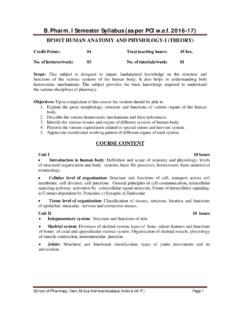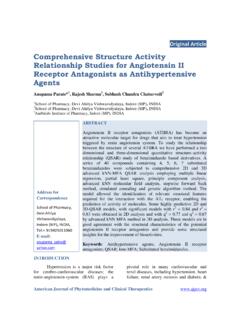Transcription of School of Pharmacy Devi Ahilya Vishwavidyalaya, Indore ...
1 1 School of Pharmacy Devi Ahilya vishwavidyalaya , Indore detailed course plan A. Subject Specification [1]. Subject title and code: Pharmacology- IV (801-T) [2]. Program(s) in which the Subject is offered: B. Pharm (If general elective available in many programs indicate this rather than list programs) [3]. Name of faculty member responsible for the Subject : Mr. Manoj Rathore Mr. Jitendra Sainy [4]. Level/year at which this Subject is offered : Final Year B.
2 Objectives [1]. Objective of the Subject: The objective is to understand the various principles of clinical pharmacology. At the end of the course , the student shall have acquired proper knowledge of various drugs, dosage regimen, adverse effects of the drugs, drug contraindications. Pharmacokinetics and pharmacodynamics of drugs & drug interactions To understand principles of toxicology of various drugs. C. Subject Description Topic/ unit No. of lectures required (i) Principles of Clinical Pharmacology: Dose individualization, Clinical pharmacokinetics, influence of disease on pharmacokinetics and pharmacodynamics, Population, pharmacokinetics.
3 6 (ii) Drugs used during infancy, neonates, in the elderly persons and their bio-pharmaceutics. 6 (iii) Drugs used during pregnancy and drug induced diseases. 5 (iv) The principles, mechanism and clinical evaluation of drug interactions. 5 (v) Common clinical laboratory tests and their interpretation. 5 (vi) General principles of Clinical toxicology. 5 (vii) Therapeutic Drug Monitoring, Concept of Essential Drugs and Rational Drug use. 5 (viii) Principles of Toxicology: Definition of poison, general principles of treatment of poisoning with particular reference to barbiturates, opioids, organophosphorous and atropine poisoning, Heavy metals and heavy metal antagonists.
4 5 Total lectures 42 2 [1]. Subject Components (total contact hours): Lecture: 4 hrs. per week Practical: No practicals Other: - [2]. Development of Learning Outcomes in Domains of Learning i. Description of the knowledge to be acquired: To understand the fundamental scientific principles of drug action and the various mechanisms by which drugs can mediate their pharmacological effect To understand the biochemical reactions that result in the metabolism of drugs within the body To understand the rationale behind designing different dosing regimens of particular drugs in specific patient populations To understand how specific patient characteristics and genetics can affect the response to a particular class of drugs
5 To understand various principles of toxicology and poisoning To understand clinical pharmacokinetics and evaluation of drugs. ii. Teaching strategies to be used to develop that knowledge: Black board teaching, Power point presentation, Overhead projector, Group discussion, Assignments. D. Learning Resources i. Essential References, Required Text(s), Electronic Materials, Web Sites, Other learning material such as computer-based programs/CD, professional standards/regulations: 1. Atkinsons, J. A., Principles of Clinical Pharmacology, Elsevier, Academic press, USA.
6 2. Reid, J., Rubin C. P., Lecture notes on Clinical Pharmacology, Blackwell science, New York. 3. Herfindal, and Hirschman, , Clinical Pharmacy and Therapeutics, William and Wilkins, Baltimore. 4. Katzung, , Basic and Clinical Pharmacology, The McGraw Hill Companies, USA. 5. Laurence, and Bennet, , Clinical Pharmacology, Churchill, Livingstone. 6. Parthasarthi, G., Nyfort-Hansen, K., Nahata, , A Textbook of Clinical Pharmacy Practice-Essential Concepts and Skills, Orient Longman. 7. Dipiro, (Ed.), Pharmacotherapy. A Pathophysiologic Approach, Appleton and Longe, Stanford, Connecticut.
7 Web resources. 3 E. Facilities Required Indicate requirements for the Subject including size of classrooms and laboratories ( number of seats in classrooms and laboratories, extent of computer access etc.) [1]. Accommodation (Lecture rooms, laboratories, etc.): 1 lecture room and 1 laboratory [2]. Computing resources: -- [3]. Other resources (specify --eg. If specific laboratory equipment is required, list requirements or attach list): No practicals in syllabus F. Subject Evaluation and Improvement Processes [1].
8 Strategies for Obtaining Student Feedback on Effectiveness of Teaching: Feedbacks from the students are taken twice in a semester. [2]. Other Strategies for Evaluation of Teaching The system exists for class test followed by 2 sessional examinations per semester for evaluation of teaching. G. List of Assignments: 4 Devi Ahilya vishwavidyalaya , Indore School of Pharmacy course plan A. Subject Specification Subject and code Pharmaceutical Industrial Management and Accountancy, 802 T Nature of Subject Compulsory course and Semester , Eighth Semester Faculty Dr.
9 Rajesh Sharma B. Objectives The objective of this subject is to develop an understanding of Different functions of management, concepts, theories and techniques implemented by Pharmaceutical Industry. Basic concepts, theories and techniques of economics, labor welfare, insurance and import and export that contribute to business decision making and development of analytical skills. Relevant accounting concepts and techniques in order to facilitate managerial decision making. C. Subject Description Unit Topic No. of Classes 01 Concept of Management.
10 Administrative Management (Planning, Organizing, Staffing, Directing and Controlling), Entrepreneurship development, Operative Management (Personnel, Materials, Production, Financial, Marketing, Time/space, Margin/Morale), Principles of Management (Co-Ordination, Communication, Motivation, Decision-making, Leadership, Innovation, Creativity, Delegation of Authority/Responsibility, Record Keeping), Identification of Key Points to give maximum thrust for development and perfection. 12 02 Economics: Principles of economics with special reference to the laws of demand and supply, demand schedule, demand curves, labor welfare, general principles of insurance and inland and foreign trade, procedure of exporting and importing goods.














